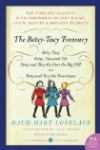11
Followers
23
Following
Reading Slothfully
I was told in elementary school that I only could read at half the speed for success in college. Oh well, one benefit of slow reading is you get to live with the characters a longer period of time. I read in a vain attempt to better understand people. At my other homes, I'm known as a spouse, pop, guy in the choir, physical chemist, computer/web dilettante and child-care provider. In theory, I'm a published author, if you consider stuff like Quenching Cross Sections for Electronic Energy Transfer Reactions Between Metastable Argon Atoms and Noble Gases and Small Molecules to count as publications. I've strewn dozens of such fascinating things to the winds.
Currently reading
Twenty Thousand Leagues Under the Seas
The Spirit of the Border
Ramona the Brave (Ramona, #3)
The Underground Man (Vintage Crime/Black Lizard)
Delilah of the Snows
Mrs. Miniver
Betsy-Tacy Treasury (P.S.)
A Christmas Carol
The Way Some People Die
Envy of Angels
Uncle Petros and Goldbach's Conjecture: A Novel of Mathematical Obsession
 A friend of mine commented that he was feeling insane. The reason had something to do with this book, so naturally, I had to badger my local library into getting me a copy.
A friend of mine commented that he was feeling insane. The reason had something to do with this book, so naturally, I had to badger my local library into getting me a copy. This was a book about a man's relationship with his uncle. The uncle was considered by his brothers to have been the family failure. Uncle Petros was a math whiz, who tried to prove one of the most difficult problems of all time, Goldbach's Conjecture, the supposition that all even numbers could be expressed by a sum of two prime numbers. People have done lots of tests to show this holds for very large numbers (this book covers a time before computers) but no one had managed a definitive proof. Uncle Petros tried diligently over several decades, but eventually became dispirited and gave up...or something. The protagonist talks about his attempts to understand better Uncle Petros and his career.
It was a fairly well written book, but I'm not sure how interesting it would be to a non-mathematical person. Since I spent my first couple of years at college thinking I might become a mathematician (and then realized I lacked adequate aptitude, so opted to become a physical chemist instead), I had some sense for what was going on. That being so, I found the book to be a compelling read.













